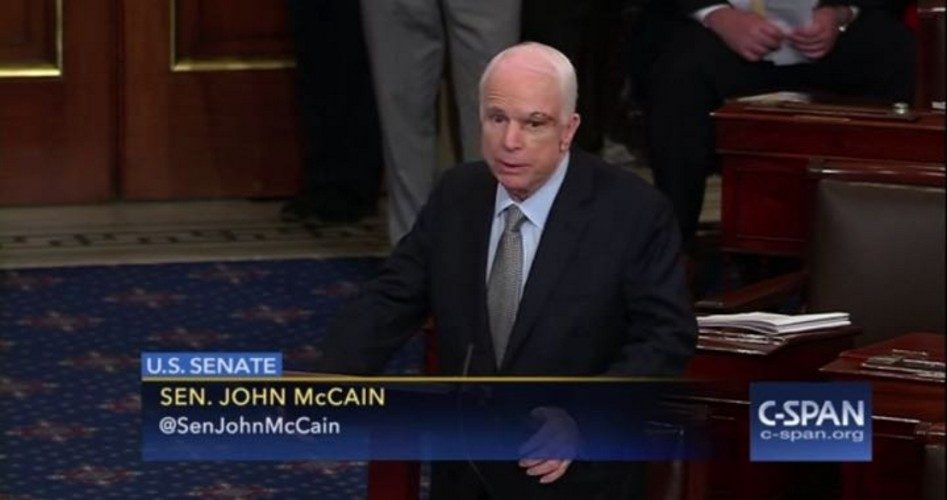
“Well, he’s the president of the United States and he’s a very good man,” Senator Orrin Hatch (R-Utah) said Monday, explaining why he thinks Senator John McCain (R-Ariz.) should change his mind and invite President Donald Trump to his funeral. McCain is suffering from brain cancer, and is not expected to live much longer.
McCain made news last week when he suggested that he did not want President Trump at his funeral, indicating that he preferred that Vice President Mike Pence represent the executive branch instead. Hatch is publicly pressing McCain to reconsider his desire that Trump not attend his funeral. “I think it’s ridiculous,” Hatch told Politico. But, Hatch conceded, “I think John should have his own wishes fulfilled with regard to who attends the funeral.”
Hatch added that he did not expect McCain to return to the Senate, but later retracted that remark, through a spokesman, who said that Hatch “spoke out of turn about Senator McCain’s status.”
The animosity between McCain, who has drifted leftward during his long tenure in the Senate, and Trump, is long-standing. During his rather unorthodox campaign for president, Trump insulted McCain’s time as a prisoner of war. McCain, a Navy bomber pilot during the Vietnam War, was shot down over North Vietnam, and spent several years in a prisoner of war camp.
Trump said in a televised Republican debate in 2016, “He’s a war hero because he was captured. I like people who weren’t captured.” McCain said last fall that Trump has never apologized for the remark.
In his soon-to-be-released book, The Restless Wave: Good Times, Just Causes, Great Fights, and Other Appreciations, McCain wrote of Trump: “The appearance of toughness or a reality show facsimile of toughness seems to matter more than any of our values.” McCain reportedly also expressed regret in the book at having put former Alaska Governor Sarah Palin on his ticket in 2008, when McCain was the Republican nominee for president. McCain lost the race to Barack Obama.
The bitterness between the president and the senator has only intensified during Trump’s presidency, as McCain has seemed to go out of his way to oppose the Trump agenda — in fact, he has thwarted a cornerstone of the Republican agenda by killing the repeal of ObamaCare more than once.
Despite winning an unusually tough reelection campaign by promising during the Republican primary to get rid of the mandate of ObamaCare, McCain did the opposite after winning his race. “I cannot in good conscience vote for the Graham-Cassidy proposal [to kill ObamaCare], he stated. “I believe we could do better working together, Republicans and Democrats, and have not yet really tried. Nor could I support it [the Graham-Cassidy bill] without knowing how much it will cost, how it will affect insurance premiums, and how many people will be helped or hurt by it. Without a full [Congressional Budget Office] score, which won’t be available by the end of the month, we won’t have reliable answers to any of those questions.”
McCain shocked many in the Republican-majority Senate when he got out of a hospital bed in Arizona, returned to Washington, and voted with the Democrats to oppose the repeal of ObamaCare. The entire Democratic Party caucus opposed the bill.
McCain, infamous among Republicans for “reaching across the aisle,” the effect of which has been to take the liberal side of legislation (such as support for special taxes to “fight global warming,” opposition to stopping illegal immigration, and his bill known as McCain-Feingold to abridge freedom of speech), offered excuses for what many in the GOP saw as betrayal. He called the process terrible, arguing that the only repeal bill he could support was one that had been through the usual bipartisan debate.
But McCain’s excuse was seen as disingenuous by many Republicans, who had been in a hurry to pass the bill, because of their ability to pass legislation with only 51 votes before the reconciliation process deadline expired. In other words, McCain was demanding something that would ensure the defeat of any attempt to gut ObamaCare.
Senator Chuck Schumer, the Democratic Minority Leader from New York, was certainly grateful to McCain for stopping the repeal of ObamaCare, declaring, “John McCain shows the same courage in Congress that he showed when he was a Naval aviator.”
But President Trump was not grateful, and used the occasion of his speech to the National Rifle Association convention in Dallas this past weekend to castigate McCain for his opposition to the repeal of ObamaCare.
Apparently, the feud between President Trump and Senator McCain, the Republican Party nominee for president in 2008, remains strong.


